九年级英语第一单元单词重要短语讲解
九年级英语上册Unit1重点词组总结
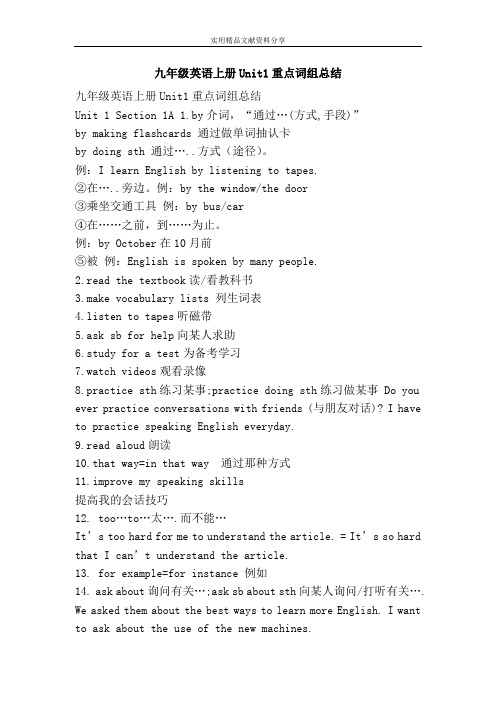
九年级英语上册Unit1重点词组总结九年级英语上册Unit1重点词组总结Unit 1 Section 1A 1.by介词,“通过…(方式,手段)”by making flashcards 通过做单词抽认卡by doing sth 通过…..方式(途径)。
例:I learn English by listening to tapes.②在…..旁边。
例:by the window/the door③乘坐交通工具例:by bus/car④在……之前,到……为止。
例:by October在10月前⑤被例:English is spoken by many people.2.read the textbook读/看教科书3.make vocabulary lists 列生词表4.listen to tapes听磁带5.ask sb for help向某人求助6.study for a test为备考学习7.watch videos观看录像8.practice sth练习某事;practice doing sth练习做某事 Do you ever practice conversations with friends (与朋友对话)? I have to practice speaking English everyday.9.read aloud朗读10.that way=in that way 通过那种方式11.improve my speaking skills提高我的会话技巧12. too…to…太….而不能…It’s too hard for me to understand the article. = It’s so hard that I can’t understand the article.13. for example=for instance 例如14. ask about询问有关…;ask sb about sth向某人询问/打听有关…. We asked them about the best ways to learn more English. I want to ask about the use of the new machines.15. watch/see/hear sb do sth观看/看见/听见某人做过某事;watch/see/hear sb doing sth观看/看见/听见某人正在做某事He can watch actors say the words. Can you hear him singing in the room?16. 辨析:sometime ;sometimes ;some times ;some time ①sometime 在将来/过去的某一时间I’ll speak to him about it sometime. 我会找个时间和他谈谈这事. I met her sometime last year.去年的某个时候我见过她. ② sometimes = at times有时,偶尔It is sometimes hot and sometimes cold here. He sometimes writes to me. ③some time A.一些时间:It will take you some time to walk there. B.在未来的某时=sometime: Phone me some time next week 下个星期什么时候给我打电话吧. ④s ome times一些次,几次 I've told him the thing some times.17. join短语:①join sb加入到某人的活动中去②join in+活动项目"参加…活动" I'd like to join in the game. ③join+组织机构"加入到某个组织机构,成为其中的一个成员"join the Party; join the League, The best way to improve your English is to join an English club18. have fun 玩得高兴19. not at all 一点也不20. get excited 高兴、激动21. end up (vi.) 结束; 告终; 结果 ; 最后end up doing sth.We end up taking a taxi there .我们结果乘出租车去了那里. We sometimes end up speaking in Chinese.(以说汉语结束对话)22. do a survey 做调查;do a survey about针对…做调查 I'm doinga survey about learning English. 我在进行学习英语的调查。
九年级英语第一单元重点词汇及短语归纳

U n i t1重点词汇一名词:n1.Textbook2.conversation3.pronunciation4.attention5.expression6.sentence7.patient8.secret9.grammar10.note11.physics12.chemistry13.speed14.partner15.ability16.brain17.knowledge二动词:v.1.discover2.repeat3.memorize4.pronounce6.increase7.born8.create9.connect10.review三形容词和副词adj& adv1.patient2.secret3.born4.Active5.lifelong6.aloud7.wisely重点短语:1.do A by doing B 用……的方式做2.be patient with sb/sth3.look up4.look up the new words in a dictionary5.be born with sth6.be born with the ability to learn/speak7.have sth in common 在某方面有共同特征8.depend on sth9.Pay attention to10.pay attention to sth /your pronunciation11.pay attention to doing sth12.be afraid to do sth /be afraid of doing sth13.connect A with B14.connect what you need to learn with sth interesting .四.句型:(一).A:How do you study English ?B:I study English by reading the textbook.(二)列举本单元英语学习方式方法:1.work with friends /a group2.ask the teacher for help3.make word cards4.listen to tapes and repeataloud5.watch English videos/movies /programms6.keep a diary in English7.have conversation with sb8.read aloud to practice pronunciation9.look up new words in a dictionary10.read word gruops 要按意群读11.listen to the conversation in English movies12.take notes/do exercises/read a lot13.write E-mail to sb(三)列举.英语学习过程中的困难。
人教版初中英语九年级一单元词汇要点语法全套解析
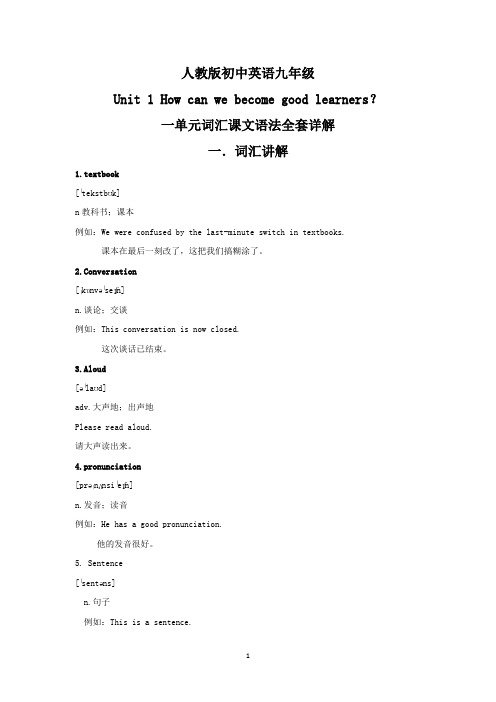
人教版初中英语九年级Unit 1 How can we become good learners?一单元词汇课文语法全套详解一.词汇讲解1.textbook[ˈtekstbʊk]n教科书;课本例如:We were confused by the last-minute switch in textbooks.课本在最后一刻改了,这把我们搞糊涂了。
2.Conversation[ˌkɒnvəˈseɪʃn]n.谈论;交谈例如:This conversation is now closed.这次谈话已结束。
3.Aloud[əˈlaʊd]adv.大声地;出声地Please read aloud.请大声读出来。
4.pronunciation[prəˌnʌnsiˈeɪʃn]n.发音;读音例如:He has a good pronunciation.他的发音很好。
5.Sentence[ˈsentəns]n.句子例如:This is a sentence.这是一个句子。
6.Patient[ˈpeɪʃnt]n.病人;adj.有耐心的例句:Louise was very patient with me when I was ill and crabby.在我生病并且脾气乖戾的日子里,路易斯对我很有耐心。
7.Expression[ɪkˈspreʃn]n.表达;表示;表达方式例句:she looked at her plate with an expression of disgust.她看着她的盘子,脸上露出很厌恶的表情。
8.Discover[dɪˈskʌvə(r)]V.发现,发觉例句:In the 19th century,gold was discovered in California 19世纪时,在加利福尼亚发现了金子。
9.Secret[ˈsiːkrət]adj.秘密的;保密的;n.秘密;秘诀;例句:Soldiers have been training at a secret location.士兵们一直在一个秘密场所训练。
人教版初三英语第一单元知识点
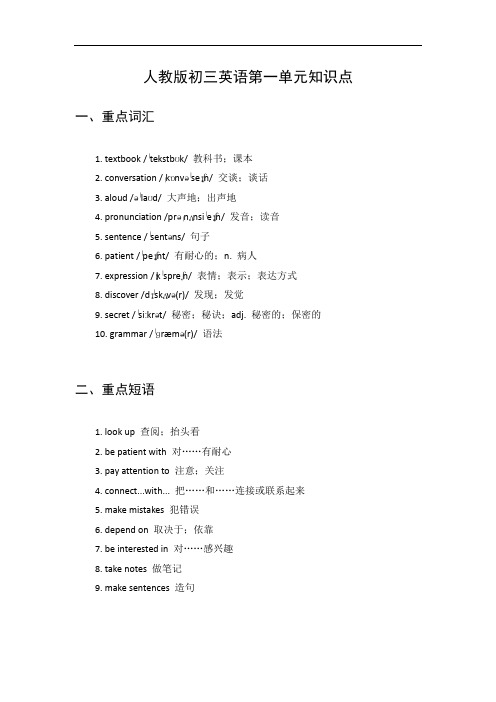
人教版初三英语第一单元知识点一、重点词汇1. textbook /ˈtekstbʊk/ 教科书;课本2. conversation /ˌkɒnvəˈseɪʃn/ 交谈;谈话3. aloud /əˈlaʊd/ 大声地;出声地4. pronunciation /prəˌnʌnsiˈeɪʃn/ 发音;读音5. sentence /ˈsentəns/ 句子6. patient /ˈpeɪʃnt/ 有耐心的;n. 病人7. expression /ɪkˈspreʃn/ 表情;表示;表达方式8. discover /dɪˈskʌvə(r)/ 发现;发觉9. secret /ˈsiːkrət/ 秘密;秘诀;adj. 秘密的;保密的10. grammar /ˈɡræmə(r)/ 语法二、重点短语1. look up 查阅;抬头看2. be patient with 对……有耐心3. pay attention to 注意;关注4. connect...with... 把……和……连接或联系起来5. make mistakes 犯错误6. depend on 取决于;依靠7. be interested in 对……感兴趣8. take notes 做笔记9. make sentences 造句三、重点句型1. —How do you study for a test? 你是怎样为考试而学习的?—I study by working with a group. 我通过和小组一起学习。
2. It's too hard to understand spoken English. 听懂英语口语太难了。
3. The more you read, the faster you'll be. 你读得越多,你就会读得越快。
4. Why did Wei Fen find it difficult to learn English? 为什么魏芬觉得学英语很难?5. I was afraid to ask questions because of my poor pronunciation. 因为我的发音不好,我害怕问问题。
九年级上册英语第一单元讲解
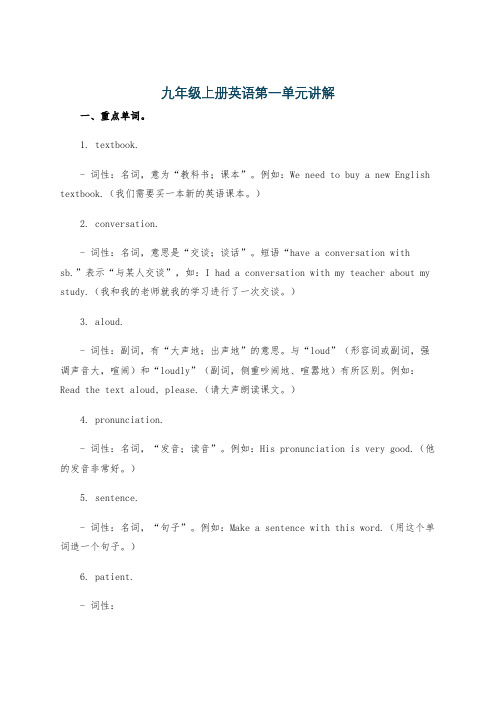
九年级上册英语第一单元讲解一、重点单词。
1. textbook.- 词性:名词,意为“教科书;课本”。
例如:We need to buy a new English textbook.(我们需要买一本新的英语课本。
)2. conversation.- 词性:名词,意思是“交谈;谈话”。
短语“have a conversation with sb.”表示“与某人交谈”,如:I had a conversation with my teacher about my study.(我和我的老师就我的学习进行了一次交谈。
)3. aloud.- 词性:副词,有“大声地;出声地”的意思。
与“loud”(形容词或副词,强调声音大,喧闹)和“loudly”(副词,侧重吵闹地、喧嚣地)有所区别。
例如:Read the text aloud, please.(请大声朗读课文。
)4. pronunciation.- 词性:名词,“发音;读音”。
例如:His pronunciation is very good.(他的发音非常好。
)5. sentence.- 词性:名词,“句子”。
例如:Make a sentence with this word.(用这个单词造一个句子。
)6. patient.- 词性:- 作形容词时,意为“有耐心的”,例如:The teacher is very patient with the students.(这位老师对学生非常有耐心。
)- 作名词时,表示“病人”,例如:The doctor has a lot of patients today.(这位医生今天有很多病人。
)7. expression.- 词性:名词,“表达(方式);表情”。
例如:His expression shows that he is very happy.(他的表情表明他非常高兴。
)8. discover.- 词性:动词,“发现;发觉”。
人教版九年级英语全册重点单词+短语+句型知识讲解
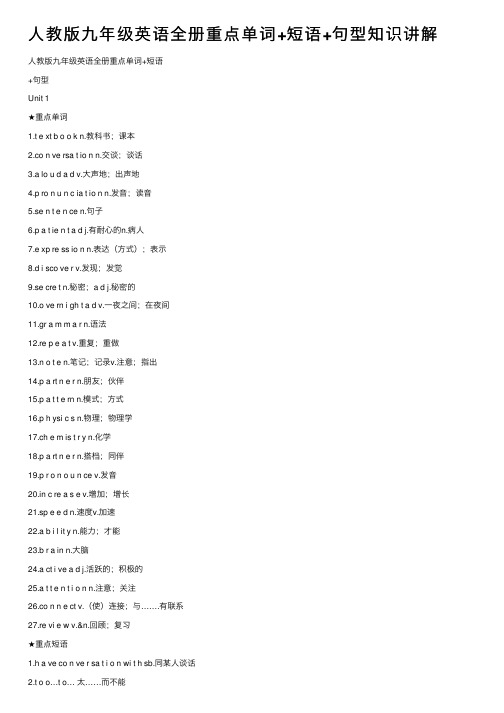
⼈教版九年级英语全册重点单词+短语+句型知识讲解⼈教版九年级英语全册重点单词+短语+句型Unit 1★重点单词1.t e xt b o o k n.教科书;课本2.co n ve rsa t io n n.交谈;谈话3.a lo u d a d v.⼤声地;出声地4.p ro n u n c ia t io n n.发⾳;读⾳5.se n t e n ce n.句⼦6.p a t ie n t a d j.有耐⼼的n.病⼈7.e xp re ss io n n.表达(⽅式);表⽰8.d i sco ve r v.发现;发觉9.se cre t n.秘密;a d j.秘密的10.o ve rn i gh t a d v.⼀夜之间;在夜间11.gr a m m a r n.语法12.re p e a t v.重复;重做13.n o t e n.笔记;记录v.注意;指出14.p a rt n e r n.朋友;伙伴15.p a t t e rn n.模式;⽅式16.p h ysi c s n.物理;物理学17.ch e m is t r y n.化学18.p a rt n e r n.搭档;同伴19.p r o n o u n ce v.发⾳20.in c re a s e v.增加;增长21.sp e e d n.速度v.加速22.a b i l it y n.能⼒;才能23.b r a in n.⼤脑24.a ct i ve a d j.活跃的;积极的25.a t t e n t i o n n.注意;关注26.co n n e ct v.(使)连接;与…….有联系27.re vi e w v.&n.回顾;复习★重点短语1.h a ve co n ve r sa t i o n wi t h sb.同某⼈谈话2.t o o…t o… 太……⽽不能3.t h e se cr e t t o… ……的秘诀4.b e a f r a id o f d o in g st h./b e a f ra id t od o st h.害怕做某事5.l o o k u p查阅6.r e p e a t o u t lo u d⼤声跟读7.m a ke m i st a k e s i n在……⽅⾯犯错误8.co n n e ct……wi t h… 把……和……连接/联系起来9.ge t b o re d感到厌烦10.b e st re sse d o u t焦虑不安的11.p a y a t t e n t io n t o注意;关注12.d e p e n d o n取决于;依靠13.t h e a b il it y t o d o st h..做某事的能⼒★重点句型1.提建议的句⼦:①W h a t/h o w a b o u t+d o in g st h?做……怎么样?如:W h a t/H o w a b o u t go in g sh o p p in g?②W h y d o n't yo u+d o st h?你为什么不做……?如:W h y d o n't yo u g o sh o p p in g?③W h y n o t+d o st h?为什么不做……?如:W h y n o t go sh o p p in g?④L e t's+d o st h.让我们做……吧。
九年级英语 Unit1 重要短语归纳(新目标英语)

九年级英语 Unit1 重要短语归纳(新目标英语)九年级英语Unit1重要短语归纳(新目标英语)Unit11.by+doing通过……方式如:bystudyingwithagroupby还可以表示:“在…旁”、“靠近”、“在…期间”、“用、”“经过”、“乘车”等如:Ilivebytheriver.Ihavetogobackbyteno’clock.Thethiefenteredtheroombythewindow.Thestudentwenttoparkbybus.2.talkabout谈论,议论,讨论如:Thestudentsoftentalkaboutmovieafterclass.学生们常常在课后讨论电影。
talktosb.===talkwithsb.与某人说话3.提建议的句子:①what/howabout+doingsth.?如:what/Howaboutgoingshopping?②whydon’tyou+dosth.?如:whydon’tyougoshopping?③whynot+dosth.?如:whynotgoshopping?④Let’s+dosth.如:Let’sgoshopping⑤Shallwe/I+dosth.?如:Shallwe/Igoshopping?4.alot许多常用于句末如:Ieatalot.我吃了许多。
5.too…to太…而不能常用的句型too+adj./adv.+todosth.如:I’mtootiredtosayanything.我太累了,什么都不想说。
6.aloud,loud与loudly的用法三个词都与"大声"或"响亮"有关。
①aloud是副词,重点在出声能让人听见,但声音不一定很大,常用在读书或说话上。
通常放在动词之后。
aloud没有比较级形式。
如:Hereadthestoryaloudtohisson.他朗读那篇故事给他儿子听。
九年级第1单元短语及知识点总汇

九年级第1单元短语及知识点总汇在初中九年级的英语教学中,第1单元通常是非常重要的一个单元。
这个单元关乎着学生对英语学习的初步了解和认识。
因此,掌握这个单元的短语和知识点是学生们进一步提高英语水平的基础。
首先,我们来看一下这个单元中的一些重要的短语。
首先是"make friends",意为"交朋友"。
作为初中生活的开始,结交朋友是每个学生都需要面对的一个问题。
通过结交朋友,我们能够相互学习、交流和成长。
"Make friends"这个短语告诉了我们,友谊是我们成长道路上的一笔财富。
接下来,我们来看一下"take it easy"这个短语。
"Take it easy"的意思是"放轻松,别紧张"。
初中是每个学生一生中最为重要的阶段之一,我们需要适应新环境,面对新的挑战。
但是同时,我们也应该学会放松自己,不要过分紧张。
因为当我们感到紧张时,思考和学习效果会受到很大的影响。
因此,"take it easy"是我们应对挑战时需要时刻提醒自己的一句话。
除了这两个短语之外,第1单元还包含了许多其他重要的知识点。
例如,我们学习了一些关于衣服和颜色的词汇。
对于初学英语的学生来说,这些基础的词汇是非常重要的。
通过学习这些词汇,我们可以更好地描述我们所见到的事物,用英语进行简单的交流。
此外,我们还学习了数字的表达方式、询问时间和日期的方法。
对于我们来说,数字是生活中不可或缺的一部分。
我们需要数字来理解时间、计算成绩、购物等等。
因此,掌握数字和时间的表达方式是学好英语的基础。
除此之外,第1单元还教给了我们如何表达 "you're welcome"(不客气)和 "What's this in English?"(这个用英语怎么说?)。
九年级英语人教版全一册_第一单元词汇讲解
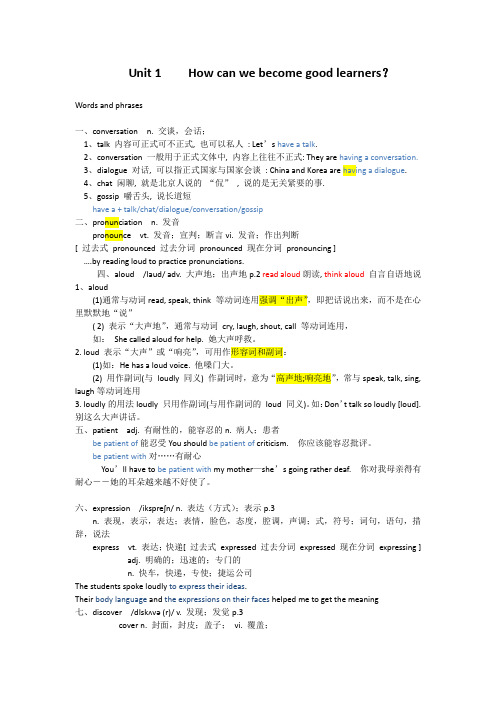
Unit 1 How can we become good learners?Words and phrases一、conversation n. 交谈,会话;1、talk 内容可正式可不正式, 也可以私人: Let’s have a talk.2、conversation 一般用于正式文体中, 内容上往往不正式: They are having a conversation.3、dialogue 对话, 可以指正式国家与国家会谈: China and Korea are having a dialogue.4、chat 闲聊, 就是北京人说的“侃”, 说的是无关紧要的事.5、gossip 嚼舌头, 说长道短have a + talk/chat/dialogue/conversation/gossip二、pronunciation n. 发音pronounce vt. 发音;宣判;断言vi. 发音;作出判断[ 过去式pronounced 过去分词pronounced 现在分词pronouncing ]….by reading loud to practice pronunciations.四、aloud /laud/ adv. 大声地;出声地p.2 read aloud朗读, think aloud自言自语地说1、aloud(1)通常与动词read, speak, think 等动词连用强调“出声”,即把话说出来,而不是在心里默默地“说”( 2) 表示“大声地”,通常与动词cry, laugh, shout, call 等动词连用,如:She called aloud for help. 她大声呼救。
2. loud 表示“大声”或“响亮”,可用作形容词和副词:(1)如:He has a loud voice. 他嗓门大。
(2) 用作副词(与loudly 同义) 作副词时,意为“高声地;响亮地”,常与speak, talk, sing, laugh等动词连用3. loudly的用法loudly 只用作副词(与用作副词的loud 同义)。
人教版九年级英语上册Unit 1单词及重点短语(附例句)
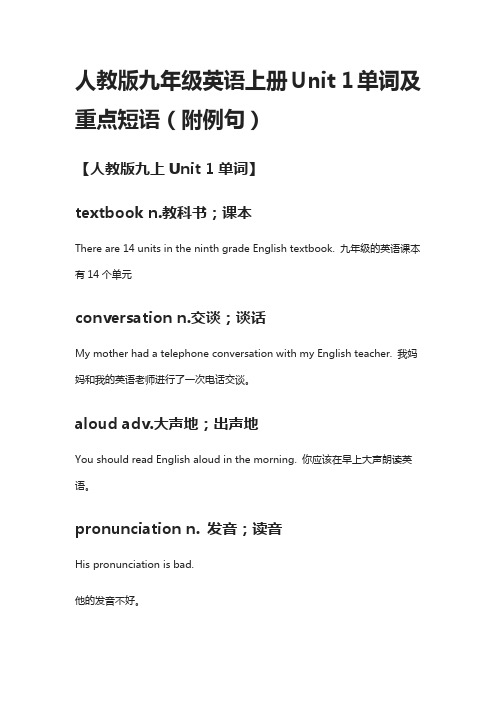
人教版九年级英语上册Unit 1单词及重点短语(附例句)【人教版九上Unit 1单词】textbook n.教科书;课本There are 14 units in the ninth grade English textbook. 九年级的英语课本有14个单元conversation n.交谈;谈话My mother had a telephone conversation with my English teacher. 我妈妈和我的英语老师进行了一次电话交谈。
aloud adv.大声地;出声地You should read English aloud in the morning. 你应该在早上大声朗读英语。
pronunciation n. 发音;读音His pronunciation is bad.他的发音不好。
sentence n.句子My sister is too young to speak out a complete sentence. 我妹妹太小了,还不能说出一个完整的句子。
patient adj.有耐心的n.病人Doctors always take care of every patient patiently. 医生总是耐心地照顾每个病人。
She is patient with everything.她对一切都很有耐心。
expression n.表达(方式);表示There was an expression of joy on her face when she heard the exciting news.当她听到这个令人兴奋的消息时,脸上露出了喜悦的表情。
discover v.发现;发觉Scientists are working to discover a better way to fight air pollution. 科学家们正在努力寻找防治空气污染的更好方法。
九年级全一册英语第一单元讲解
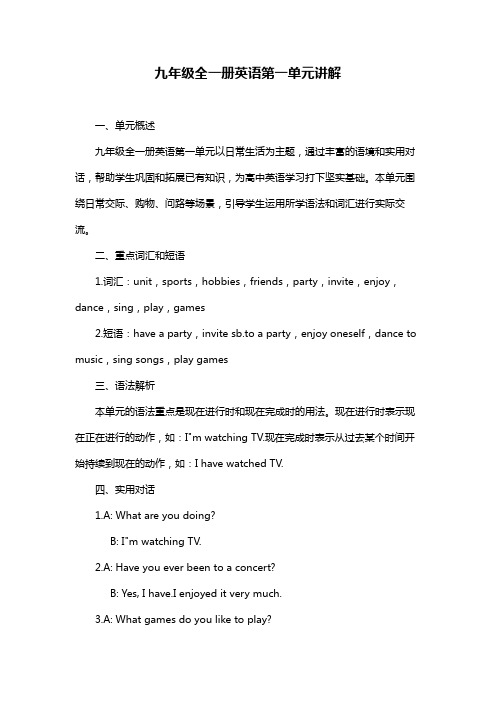
九年级全一册英语第一单元讲解一、单元概述九年级全一册英语第一单元以日常生活为主题,通过丰富的语境和实用对话,帮助学生巩固和拓展已有知识,为高中英语学习打下坚实基础。
本单元围绕日常交际、购物、问路等场景,引导学生运用所学语法和词汇进行实际交流。
二、重点词汇和短语1.词汇:unit,sports,hobbies,friends,party,invite,enjoy,dance,sing,play,games2.短语:have a party,invite sb.to a party,enjoy oneself,dance to music,sing songs,play games三、语法解析本单元的语法重点是现在进行时和现在完成时的用法。
现在进行时表示现在正在进行的动作,如:I"m watching TV.现在完成时表示从过去某个时间开始持续到现在的动作,如:I have watched TV.四、实用对话1.A: What are you doing?B: I"m watching TV.2.A: Have you ever been to a concert?B: Yes, I have.I enjoyed it very much.3.A: What games do you like to play?B: I like to play soccer and basketball.五、练习与拓展1.根据所学词汇和短语,与同学或家人进行对话练习。
2.仿照实用对话,创作属于自己的对话。
3.利用现在进行时和现在完成时,描述自己或他人的日常生活。
本单元旨在帮助学生提高英语实际交际能力,通过对话练习和场景应用,使学生在日常生活中更自信地使用英语。
最新版九年级第一单元重点单词和短语用法
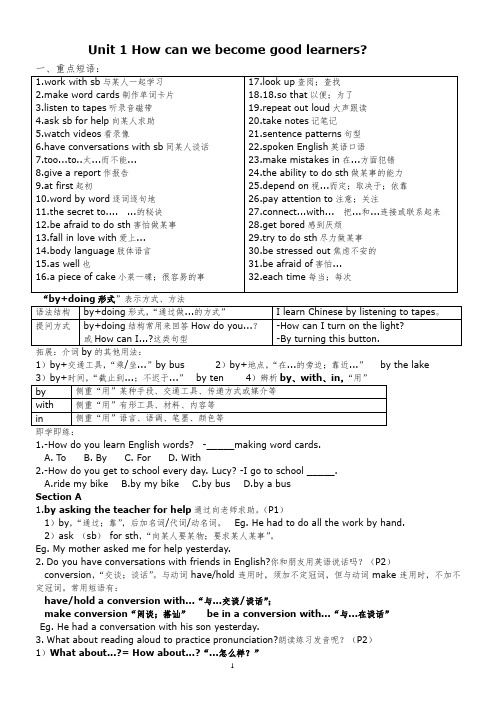
Unit 1 How can we become good learners?拓展:介词by的其他用法:1)by+交通工具,“乘/坐...”by bus 2)by+地点,“在...的旁边;靠近...”by the lake1.-How do you learn English words? -_____making word cards.A. ToB. ByC. ForD. With2.-How do you get to school every day. Lucy? -I go to school _____.A.ride my bikeB.by my bikeC.by busD.by a busSection A1.by asking the teacher for help通过向老师求助。
(P1)1)by,“通过;靠”,后加名词/代词/动名词。
Eg. He had to do all the work by hand.2)ask (sb)for sth,“向某人要某物;要求某人某事”。
Eg. My mother asked me for help yesterday.2.Do you have conversations with friends in English?你和朋友用英语说话吗?(P2)conversion,“交谈;谈话”。
与动词have/hold连用时,须加不定冠词,但与动词make连用时,不加不定冠词。
常用短语有:have/hold a conversion with...“与...交谈/谈话”;make conversion“闲谈;搭讪”be in a conversion with...“与...在谈话”Eg. He had a conversation with his son yesterday.3.What about reading aloud to practice pronunciation?朗读练习发音呢?(P2)1)What about...?= How about...?“...怎么样?”Don’t talk so loud.不要那么高声的谈话。
九年级上册英语第一单元知识点

九年级上册英语第一单元知识点第一单元是九年级上册英语的开篇单元,主要介绍了一些基础的英语知识点。
下面是对该单元的知识点进行详细解析。
1. 重点词汇和短语在这一单元中,我们需要掌握一些重要的词汇和短语。
例如:- greet:问候- introduce:介绍- classmate:同学- subject:科目- foreign:外国的- born:出生- age:年龄- nationality:国籍- speak:说话- speak English:说英语- surprise:惊讶- lucky:幸运的- guess:猜这些词汇和短语在日常英语中经常使用,掌握它们有助于提高我们的英语交流能力。
2. 问候和自我介绍这一单元还涉及到如何进行问候和自我介绍。
例如,我们学习了一些常用的问候语,如:- How are you?:你好吗?- Good morning/afternoon/evening:早上/下午/晚上好- Nice to meet you:很高兴见到你在自我介绍方面,我们需要能够介绍自己的名字、年龄、国籍等信息。
例如:- My name is Tom.:我的名字叫汤姆。
- I'm thirteen years old.:我今年十三岁。
- I'm from China.:我来自中国。
通过学习这些知识点,我们可以在日常生活中更加自如地与他人交流。
3. 数字和年龄在这一单元中,我们还需要掌握数字和年龄的表达方式。
例如,我们需要学习1-20的英文表达形式:- one:一- two:二- three:三- ...- twenty:二十此外,我们还需要学会询问他人的年龄以及回答这个问题。
例如:- How old are you?:你几岁了?- I'm fifteen years old.:我十五岁。
数字和年龄是我们生活中经常用到的概念,掌握它们对我们的英语学习非常重要。
4. 国籍和语言在这个单元,我们还学习了如何询问他人的国籍以及使用的语言。
人教版英语九年级英语Unit1词汇梳理+短语总结+用法归纳
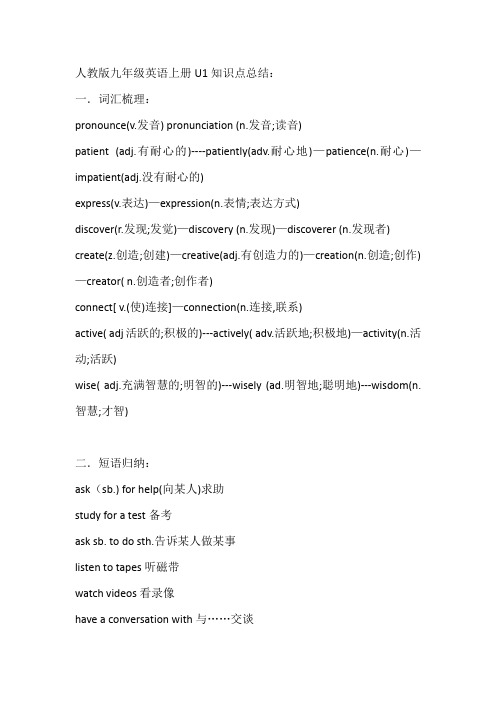
人教版九年级英语上册U1知识点总结:一.词汇梳理:pronounce(v.发音) pronunciation (n.发音;读音)patient (adj.有耐心的)----patiently(adv.耐心地)—patience(n.耐心)—impatient(adj.没有耐心的)express(v.表达)—expression(n.表情;表达方式)discover(r.发现;发觉)—discovery (n.发现)—discoverer (n.发现者) create(z.创造;创建)—creative(adj.有创造力的)—creation(n.创造;创作)—creator( n.创造者;创作者)connect[ v.(使)连接]—connection(n.连接,联系)active( adj活跃的;积极的)---actively( adv.活跃地;积极地)—activity(n.活动;活跃)wise( adj.充满智慧的;明智的)---wisely (ad.明智地;聪明地)---wisdom(n.智慧;才智)二.短语归纳:ask(sb.) for help(向某人)求助study for a test备考ask sb. to do sth.告诉某人做某事listen to tapes听磁带watch videos看录像have a conversation with与……交谈make word cards制作单词卡片read aloud 大声朗读word by word 逐字地,一字一字地give a report 作报告the secret to... ……的秘诀[bit by bit一点一点地take notes记笔记fall in love with爱上……look up(在词典、参考书中或通过电脑)查阅;抬头看make mistakes(make a mistake)犯错;出错be born with天生具有by mistake错误地;无意中depend on依靠;取决于mistake.. . for.. .把……错当成……have...in common在……方面有共同之处be interested in对……感兴趣pay attention to注意;关注learn from从……中学习write down写下;记录下look for寻找on one's own独自;单独;独立地instead of代替:而不是find out找出;查明over and over again多次;一再;反复地a little =a bit一点儿;稍微at first起初as well也connect.. .with...把…·…和…连接或联系起来write e-mails to给…写电子邮件keep a diary 记日记the ability to do sth.做某事的能力think about思考;考虑whether or not是否think of想起;考虑be good at = do well in擅长think over仔细考虑worry about 扣心even if = even though 即使;纵然;虽然三.用法总结:practice doing sth.练习做某事by doing sth.通过做某事keep doing sth.继续做某事,直做某事What about doing...?做....怎么样?finish doing sth.完某事the +比较级,the+ 比较级越....越..... 做find it +adj. + to do sth.发现做某事..... need to do sth.需要做某事r remember to do sth. 记得要做某事r be afraid of doing sth.害怕会发生某事remember doing sth. 记得做过某事[ be afraid to do sth.不敢做某事try to do sth.尽力做某事It's +adj. +to do sth.做某事...的。
九年级英语第一单元单词重要短语讲解
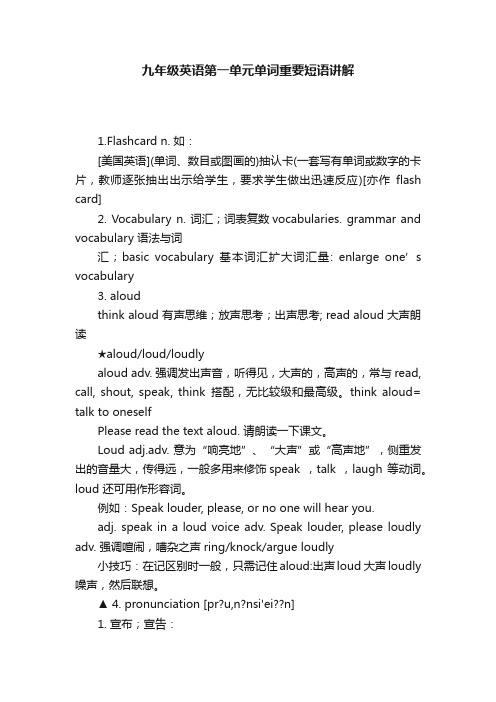
九年级英语第一单元单词重要短语讲解1.Flashcard n. 如:[美国英语](单词、数目或图画的)抽认卡(一套写有单词或数字的卡片,教师逐张抽出出示给学生,要求学生做出迅速反应)[亦作flash card]2. Vocabulary n. 词汇;词表复数vocabularies. grammar and vocabulary 语法与词汇;basic vocabulary 基本词汇扩大词汇量: enlarge one’s vocabulary3. aloudthink aloud 有声思维;放声思考;出声思考; read aloud 大声朗读★aloud/loud/loudlyaloud adv. 强调发出声音,听得见,大声的,高声的,常与read, call, shout, speak, think搭配,无比较级和最高级。
think aloud= talk to oneselfPlease read the text aloud. 请朗读一下课文。
Loud adj.adv. 意为“响亮地”、“大声”或“高声地”,侧重发出的音量大,传得远,一般多用来修饰speak ,talk ,laugh 等动词。
loud 还可用作形容词。
例如:Speak louder, please, or no one will hear you.adj. speak in a loud voice adv. Speak louder, please loudly adv. 强调喧闹,嘈杂之声ring/knock/argue loudly小技巧:在记区别时一般,只需记住aloud:出声loud 大声loudly 噪声,然后联想。
▲ 4. pronunciation [pr?u,n?nsi'ei??n]1. 宣布;宣告:2. 发…的音;发音;念字,读字;注…的音,注意:1)pronunciation 和pronounce 各自的拼写和词性pronunciation n. He speaks English fluently, but his pronunciation is poor.pronounce vt. 1) 发音How do you pronounce this word, please?2) 宣布The doctor pronounced the death of the man.the priest said, “I now pronounce you man and wife.”神父说:“我现在宣布你们两人结为夫妻。
九年级上册英语第一单元知识点
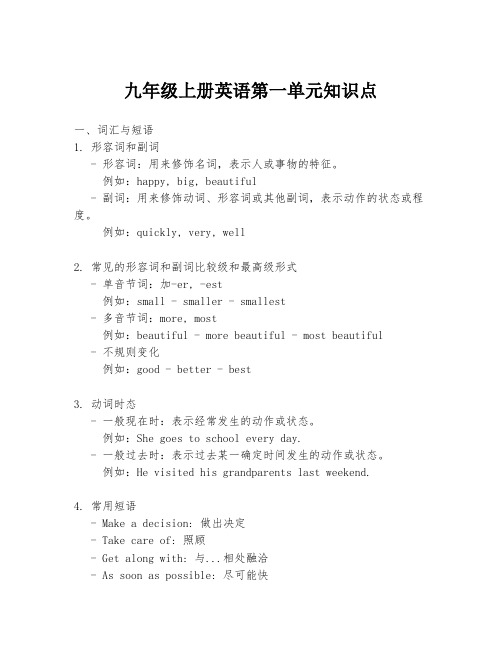
九年级上册英语第一单元知识点一、词汇与短语1. 形容词和副词- 形容词:用来修饰名词,表示人或事物的特征。
例如:happy, big, beautiful- 副词:用来修饰动词、形容词或其他副词,表示动作的状态或程度。
例如:quickly, very, well2. 常见的形容词和副词比较级和最高级形式- 单音节词:加-er, -est例如:small - smaller - smallest- 多音节词:more, most例如:beautiful - more beautiful - most beautiful- 不规则变化例如:good - better - best3. 动词时态- 一般现在时:表示经常发生的动作或状态。
例如:She goes to school every day.- 一般过去时:表示过去某一确定时间发生的动作或状态。
例如:He visited his grandparents last weekend.4. 常用短语- Make a decision: 做出决定- Take care of: 照顾- Get along with: 与...相处融洽- As soon as possible: 尽可能快二、语法点1. 比较级和最高级的构成- 规则变化:形容词和副词的比较级和最高级通常是通过在词尾加上-er和-est构成。
- 不规则变化:一些形容词和副词的比较级和最高级形式是不规则的,需要特别记忆。
- 双重比较级:使用more和less来构成比较级和最高级,适用于多音节和一些单音节形容词。
2. 比较级和最高级的用法- 比较级用于比较两者之间的差别。
例如:My sister is taller than me.- 最高级用于比较三者或三者以上的人或事物。
例如:Tom is the tallest student in our class.3. 时态的使用- 一般现在时通常用于描述习惯性动作或普遍真理。
人教版英语九年级上册第一单元重点短语
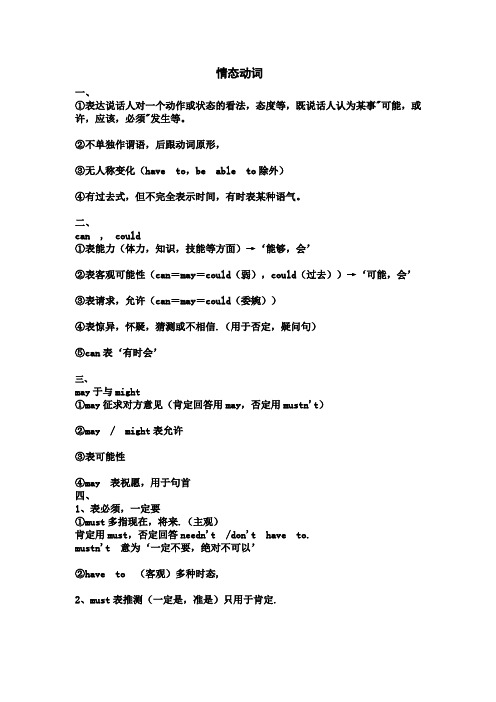
情态动词
一、
①表达说话人对一个动作或状态的看法,态度等,既说话人认为某事"可能,或许,应该,必须"发生等。
②不单独作谓语,后跟动词原形,
③无人称变化(have to,be able to除外)
④有过去式,但不完全表示时间,有时表某种语气。
二、
can , could
①表能力(体力,知识,技能等方面)→‘能够,会’
②表客观可能性(can=may=could(弱),could(过去))→‘可能,会’
③表请求,允许(can=may=could(委婉))
④表惊异,怀疑,猜测或不相信.(用于否定,疑问句)
⑤can表‘有时会’
三、
may于与might
①may征求对方意见(肯定回答用may,否定用mustn't)
②may/ might表允许
③表可能性
④may表祝愿,用于句首
四、
1、表必须,一定要
①must多指现在,将来.(主观)
肯定用must,否定回答needn't /don't have to.
mustn't 意为‘一定不要,绝对不可以’
②have to (客观)多种时态,
2、must表推测(一定是,准是)只用于肯定.。
初三英语第一单元单词讲解
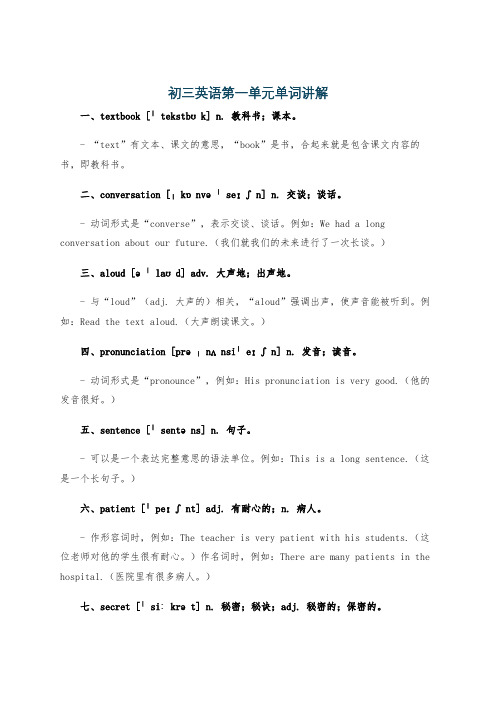
初三英语第一单元单词讲解一、textbook [ˈtekstbʊk] n. 教科书;课本。
- “text”有文本、课文的意思,“book”是书,合起来就是包含课文内容的书,即教科书。
二、conversation [ˌkɒnvəˈseɪʃn] n. 交谈;谈话。
- 动词形式是“converse”,表示交谈、谈话。
例如:We had a long conversation about our future.(我们就我们的未来进行了一次长谈。
)三、aloud [əˈlaʊd] adv. 大声地;出声地。
- 与“loud”(adj. 大声的)相关,“aloud”强调出声,使声音能被听到。
例如:Read the text aloud.(大声朗读课文。
)四、pronunciation [prəˌnʌnsiˈeɪʃn] n. 发音;读音。
- 动词形式是“pronounce”,例如:His pronunciation is very good.(他的发音很好。
)五、sentence [ˈsentəns] n. 句子。
- 可以是一个表达完整意思的语法单位。
例如:This is a long sentence.(这是一个长句子。
)六、patient [ˈpeɪʃnt] adj. 有耐心的;n. 病人。
- 作形容词时,例如:The teacher is very patient with his students.(这位老师对他的学生很有耐心。
)作名词时,例如:There are many patients in the hospital.(医院里有很多病人。
)七、secret [ˈsiːkrət] n. 秘密;秘诀;adj. 秘密的;保密的。
- 作名词,例如:She told me a secret.(她告诉了我一个秘密。
)作形容词,例如:This is a secret meeting.(这是一个秘密会议。
)八、look up 查阅;抬头看。
人教版九年级英语上册Unit 1单词及重点短语(附例句)

人教版九年级英语上册Unit 1单词及重点短语(附例句)【人教版九上Unit 1单词】textbook n.教科书;课本There are 14 units in the ninth grade English textbook. 九年级的英语课本有14个单元conversation n.交谈;谈话My mother had a telephone conversation with my English teacher. 我妈妈和我的英语老师进行了一次电话交谈。
aloud adv.大声地;出声地You should read English aloud in the morning. 你应该在早上大声朗读英语。
pronunciation n. 发音;读音His pronunciation is bad.他的发音不好。
sentence n.句子My sister is too young to speak out a complete sentence. 我妹妹太小了,还不能说出一个完整的句子。
patient adj.有耐心的n.病人Doctors always take care of every patient patiently. 医生总是耐心地照顾每个病人。
She is patient with everything.她对一切都很有耐心。
expression n.表达(方式);表示There was an expression of joy on her face when she heard the exciting news.当她听到这个令人兴奋的消息时,脸上露出了喜悦的表情。
discover v.发现;发觉Scientists are working to discover a better way to fight air pollution. 科学家们正在努力寻找防治空气污染的更好方法。
- 1、下载文档前请自行甄别文档内容的完整性,平台不提供额外的编辑、内容补充、找答案等附加服务。
- 2、"仅部分预览"的文档,不可在线预览部分如存在完整性等问题,可反馈申请退款(可完整预览的文档不适用该条件!)。
- 3、如文档侵犯您的权益,请联系客服反馈,我们会尽快为您处理(人工客服工作时间:9:00-18:30)。
1.Flashcard n. 如:[美国英语](单词、数目或图画的)抽认卡(一套写有单词或数字的卡片,教师逐张抽出出示给学生,要求学生做出迅速反应)[亦作flash card]2. Vocabulary n. 词汇;词表复数vocabularies. grammar and vocabulary 语法与词汇;basic vocabulary 基本词汇扩大词汇量: enlarge one’s vocabulary3. aloudthink aloud 有声思维;放声思考;出声思考; read aloud 大声朗读★aloud/loud/loudlyaloud adv. 强调发出声音,听得见,大声的,高声的,常与read, call, shout, speak, think搭配,无比较级和最高级。
think aloud= talk to oneselfPlease read the text aloud. 请朗读一下课文。
Loud adj.adv. 意为“响亮地”、“大声”或“高声地”,侧重发出的音量大,传得远,一般多用来修饰speak ,talk ,laugh 等动词。
loud 还可用作形容词。
例如:Speak louder, please, or no one will hear you.adj. speak in a loud voice adv. Speak louder, please loudly adv. 强调喧闹,嘈杂之声ring/knock/argue loudly小技巧:在记区别时一般,只需记住aloud:出声loud 大声loudly 噪声,然后联想。
▲ 4. pronunciation [prəu,nʌnsi'eiʃən]1. 宣布;宣告:2. 发…的音;发音;念字,读字;注…的音,注意:1)pronunciation 和pronounce 各自的拼写和词性pronunciation n. He speaks English fluently, but his pronunciation is poor.pronounce vt. 1) 发音How do you pronounce this word, please?2) 宣布The doctor pronounced the death of the man.the priest said, “I now pronounce you man and wife.”神父说:“我现在宣布你们两人结为夫妻。
”5. Specificadj. 特殊的,特定的;明确的;详细的比较级more specific 最高级most specific ] specific adj. 特定的,详细的specific suggestions/things具体的,明确的You said you like sports, could you be a bit morespecific?special adj. 特别的I’ll send my da ughter a special birthday gift next month.6. Memorize 例:Never just memorize single English words.千万不要只记英语单词。
1.memorize 1) vt. memorize sth. Memorize the new words of Unit One, please.2) 与remember的区别memorize强调动作,加强记忆remember强调记得,想起,回忆起记忆中的人和事eg. I remember China won 32 gold medals in 28th Olympic Games.3) memory[c.] A)个人记忆力,记性 a good//bad/terrible/long/short memoryB)记住的事happy memories of childhood.[u.] 记忆力Memory is very important to the English learners.7.grammar mistakes in grammar 语法错误▲8 differentlydifferently adv. think differently 有不同看法feel differentlyThe two words sound t he same, but they’re spelled differently.Boys and girls behave ~ on the same occasion.difference n. have ~ in sth have 4 differences in sth.different adj. be ~ from9.frustrate [frʌs'treit] frustrating; frustratedSth+frustrate +sb. (物作主语) vt. 使…沮丧,使…受挫sb. be/get frustrated 某人很沮丧sth. be frustrating 某事令人沮丧frustration [unc.] 沮丧,挫折类似感到……令人……interest ~ed ~ingdisappoint ~ed ~ingworry ~ied ~ingrelax ~ed ~ing词尾以e结尾amaze ~d 去e~ingsurprise ~d 去e ~ingexcite ~d 去e ~ingbore ~d 去e ~ingplease ~d 去e ~ing/pleasanttire ~d 去e ~ingmove ~d 去e ~ingdepress ~d ~ing▲10. quickly ,as quickly as possible 尽快对应的形容词quickquickly: 动作的迅速He had breakfast ~and drove to work.fast: 速度快run./speak ~soon:时间快Take th is medicine 3 times a day and you’ll be fine~ .11.addadd v. 加,增加,补充说add A (to B) 增加,加eg. add some sugar add some names to the listIf you add 5 to/and 3, you’ll get 8. “I’ll come late” she added.Add up合计,add up to…总计达▲12. excited: feel /be get / excited比较级more excited 最高级most excited ]v. excite使激动,使兴奋;刺激:The news excited us.那消息使我们心情激动。
exciting 令人兴奋的13 not at all not at all1. 根本不,完全不,一点也不I don’t like it at all.2. [客套语]没什么,别客气,哪儿话,不用谢(= [美国英语]You're welcome.) not at all 1) 不用谢Thank you! -- Not at all.2) 不介意Would you mind my sitting here? – No, not at all.3) 一点儿也不(完全否定)How do you like rap? -- I don’t like itat all.not a bit = not… at all一点也不not a little = very/much/very much 非常,很(多)14.end upend up doing sth例子:end up 1) end up (in) doing We didn’t like it but we ended up cheering.2) end up + 介词短语Drive carefully, or you’ll end up in hospital.end (up) with 以…结束He ended up his speech with a bow.15.spokenspoken English /written English English-speaking countries /people.▲16. Slowly: more slowly; walk slowlySlow adj. v.slow down 放慢速度▲17 mistake过去式mistook 过去分词mistaken 现在分词mistaking ]mistake 1) [c] make/correct a mistake (in spelling/grammar)2)vt. mistake-mistook-mistaken ~sth 误解I mistook what he said andgot annoyed.Mistake sb./sth. for sb./sth. 把…错当成Sorry, I mistook your umbrella for mine.3) 固定搭配do sth by mistake 错误地,强调某种行为并非故意She put salt into her tea by mistake.ma 逗号英音:['kɔmə]美音:['kɑmə]19. challengechallenge 1) n. give/ accept a ~ 挑战/ 应战 a big ~ face a ~ 2)vt. ~ sb. to sth/to do sth. 就…向某人挑战They challenged us to a baseball match. She challenged me to play tennis.20. solutionsolution[c] a ~ of/for/to …的解决办法we had a meeting and found a ~ to the problem at last.solve vt. solve sth.21. later on1)later/later on “后来,随后” 用于将来时和一般过去时I’ll explain the case later. The old man got cancer and died later.2)一段时间+later“…以后” 用于过去时或将来时in +一段时间“…以后”用于将来时表将来一段时间后或过去一段时间内after +一段时间”…以后” 用于过去时He worked so hard at math and a year later, he caught up with his classmates.We’ll have an English test in two weeks.They went on working after a short break.3)sooner or later迟早Yo u’ll understand your parents sooner or late▲22. realize vt. 实现;认识到;了解1) vt. a. 意识到(不用于进行时,无被动语态)He ~d his mistake at last.b. 实现~ one’s dream=one’s dream come true2) vi. ~that从句Do you realize that you’re an hour late?3)~how/what/who etc. The foreigners realized how amazing Chinese culture is afterthe opening ceremony of the29th Olympic Games.▲23. matter V.重要用于疑问否定条件句Does this matter?这些重要吗?I t d oesn’t matter. 没关系It doesn’t matter to me what you do or where you go.N.物质,事物,问题v. Sorry. –It doesn’t matterDoes it matter if…n. No matter what /who /how /where … = whatever /whoever /however /whereverNo matter where you are, I’ll try to find you.What’s the matter with…=What’s wrong with..▲24.Afraidadj.[一般作表语]afraid adj. 1) be ~ of sb/sth. People are afraid of dangerous animals like snakes and tigers.害怕,畏惧,担心2) be ~ of doing sth. My dad has always been afraid of flying.3) be ~ (that ) I’m afraid that she might be upset if we told herthe bad news.4) be afraid so./not. 恐怕是这样/ 恐怕不是的。
